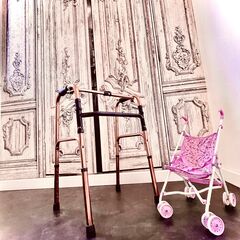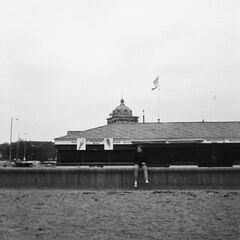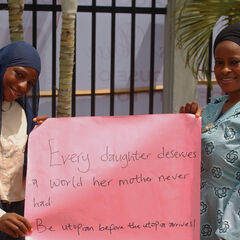2025 "Real Utopias"
Competition results
We are delighted to announce the results of this year’s photography competition on the theme of the sociology of real utopias.
Entrants were invited to capture in a photo real utopias in the world around us.
They were asked to think about the big or small ways that real utopia exists in the world around us and capture their interpretation of the term in photographic form.
The competition was open to all GCSE and A-Level (or equivalent i.e. International Baccalaureate) students in the UK and abroad.
You can find the winner, and four runners-up below. Each picture is accompanied by the text submitted by the student explaining the sociological thinking behind the image.
The Department would like to thank everyone who entered the competition this year, as well as the teachers for their support!
Winning Entry:
Adopt a Grandparent
Emilia Kosiorek, AKADEMEIA HIGH SCHOOL
"In today’s fast-moving world, families are often torn apart by distance. People move away for work or study, leaving behind parents and grandparents. The bonds may not completely disappear, but they fade, and what’s left is longing. Too often, loved ones are gone before we’ve had the chance to truly connect again. What remains are the “orphans of circumstance”: the elderly, whose greatest enemies are loneliness and the feeling of no longer being needed, and the young, who lack someone to tell them stories of the past, share family recipes, or simply help them with life. We adopt children from orphanages. We adopt dogs from shelters. But what if we could adopt grandparents? Not legally - just by offering something more meaningful than gifts: our time and attention. Time to hear their stories, include them in our everyday lives, and give them a reason to feel seen again. In return, we receive wisdom, warmth, and roots that deepen our own identity. My photograph shows two objects - a child’s toy stroller and an old man’s walking frame - symbols of two worlds waiting to be united. Behind that door, in the scene I imagine, strangers become family. There’s no shared blood - only shared moments. Only humanity. A utopia? No. It can be real if we choose to make it so. By adopting grandparents, we can open the door to a kinder, more connected and compassionate world."
Runners up:
The Great Escape
Sasha Gillsmith, Stroud High School
"This photo is displaying Fleeting moments of serenity and joy, people connected through the spirit of dance and freedom – the great escape from society. I felt drawn to the idea of bacchic music and dance when I thought of ‘real utopias’ as, in my mind, its one of the only spaces people are truly themselves and truly one with other people. Like the composition of this photo, real utopias can be messy and unorganised relying on collectivism to be organised rather than neo-liberal individualistic ideals. This photo here may not be a ‘real’ utopia, but it symbolizes how people reclaim space, connect across difference, and momentarily transcend alienation. As Wright argues, small utopian practices can challenge the dominant system of capitalism that tries to establish order and civility. This photo demonstrates a microcosm of resistance of the system, chaotic and colourful. Showing how the future of our society is bright but hazy."
Public Utopias
Aurora Karaj, Southend High School for Girls
"The idea of utopia for me does not exist merely in the fantasy but exists in public spaces. I captured this photo of my friend on the local beach, after a long day of trying to find something to do (without any money). In the background of the photo the 'Kursaal' building caught my eye, its dome and spire set itself apart from any other building in my town. I went to the local archives at the library and discovered that the Kursaal was once a ballroom and a venue for live performances, it then was bought by the council which changed it to an arcade, till its abandonment in 2019. The recordings I saw of the Kursaal in its ballroom days were bursting with joy, a joy I can not imagine had ever existed when I look at the empty and gutted building today. This discovery made me realise the vital role that public spaces have in our lives, especially in a society where it seems as if it costs money to be anywhere. Austerity and privatisation have led to the lack of funding into public spaces for people in England, yet areas like this beach still provide me with hope in a better society. Even though the Kursaal did not survive, Southend beach will remain through any budget cuts and will bring together the people of the city. The beach is a place for everyone to enjoy, regardless of who they are."
Sunlit Harmony
Lilly Marriott, Ridgewood School Doncaster
"The shadows are close and connected which symbolises unity and belonging, these are all core elements of a ‘utopian’ society and with the idea of a real utopia there is an emphasis on strong social bonds and harmonious relationships. The choice to use shadows was to ensure that everyone is represented in the same way to ensure equality as there is no reason to judge one another. The shadows also allow for the image to be interoperated however the viewer wants to, so it can be envisioned many ways by each viewer. My photo is a metaphor for ‘real utopia’ as all the people are equal, and at peace even if only for fleeting moment in the sun. The photo in itself is a very peaceful photo which mirrors how the world would be in a utopian society."
They Raised Each Other and a Sign - Tariq Lawal
"In 2025, Nigeria remains far from achieving gender equality, with progress hindered by systemic barriers and deep-rooted patriarchal norms. Girls' rights advocate Zaheera and her supportive mother, Monsurat, held a demonstration, raising a sign that reads: “Every daughter deserves a world her mother never had. Be utopian before the utopia arrives.” Set in a public space within a conservative country with a shrinking civic space, the image captures a rare and radical moment of gentle resistance. In recent years, the Nigerian government has increasingly cracked down on activism and dissent. Amidst this collective struggle, Zaheera and Monsurat’s joyful defiance, rooted in love, care, and a shared vision, reflects the essence of a real utopia—a feminist one, at that. To be utopian before the utopia arrives is to act in hope, even when the dream feels far away. Their shared action is not only symbolic but transformative. In a society where it is uncommon for parents to support their children’s advocacy for justice and gender equality, this moment becomes a living example of what sociologist Erik Olin Wright described as a real utopia: an existing practice with the potential to reshape society. Their smiles tell a powerful story. This is resistance expressed through joy and protest grounded in love. It reminds us that we can challenge oppression while staying connected to our humanity. Now more than ever, we need intergenerational solidarity to build a more just and gender-equal world."





